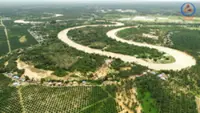KOTA KINABALU: Sabah Umno has urged the state government to tighten the reins on road maintenance concessionaires following a viral video of workers pouring tar into a pothole using a kitchen kettle.
Its election director, Jeffery Nor Mohamed questioned if this was an isolated incident or indicative of a larger pattern of substandard road maintenance across the state.
"I am sure this ‘magic kettle’ method has been used not just once but many times.
"Is this the standard of (maintenance) that the people of Sabah should accept?" he said in a statement on Friday (March 14).
The video, which previously made the rounds on social media, was taken along Jalan Kampung Kelanahan in Papar.
ALSO READ: QuickCheck: Were potholes along a Sabah road patched using kettles?
Federal Works Minister Datuk Seri Alexander Nanta Linggi confirmed that the location was a state road under a maintenance concessionaire, not a federal project, but the ministry took the matter seriously and had called for an investigation.
He said the concession company had been reminded to follow procedures and prioritise quality and safety.
However, Jeffery argued that reminders were insufficient, especially when potholes have led to fatal accidents.
He criticised the prolonged contracts given to maintenance concessionaires, saying repeated failures should warrant stricter action.
"If a concession company is no longer capable and has made several mistakes, not just in one location, what real action should be taken? This is the problem in Sabah – we have only (a few) concessionaires appointed for years to maintain the roads," he said.
He said urgent reforms were needed as many state roads, especially in rural areas, are in poor condition.
"I suggest that concession contracts should not exceed three years so that these companies remain competitive and accountable.
"Road maintenance companies must also be appointed based on specific zones in Sabah to ensure higher quality and sincerity in their work," he said.
He also called for firm action to address Sabah’s broader infrastructure issues, including water and electricity supply, stressing that practical solutions are needed rather than political rhetoric.
"Our capabilities and limitations must be examined thoroughly. We do not need to play politics while our people continue to suffer," he added.





